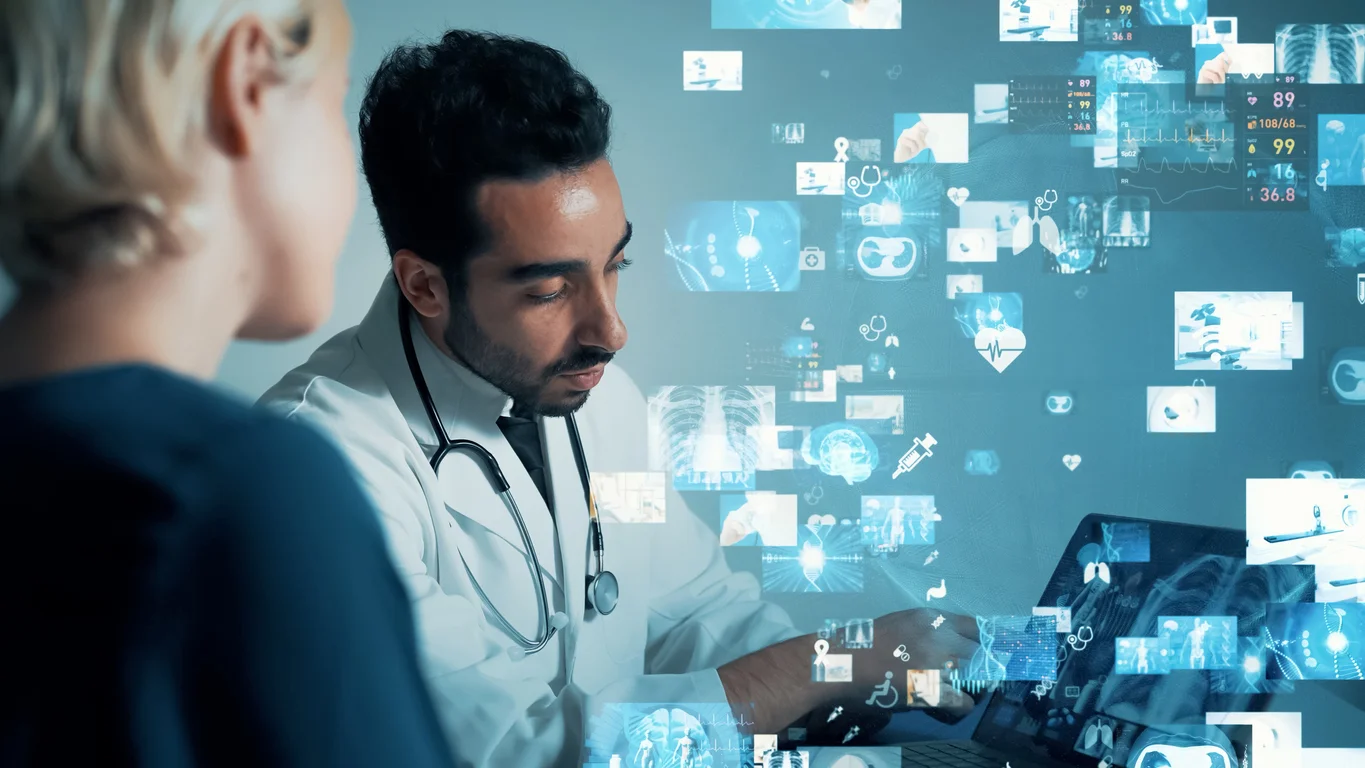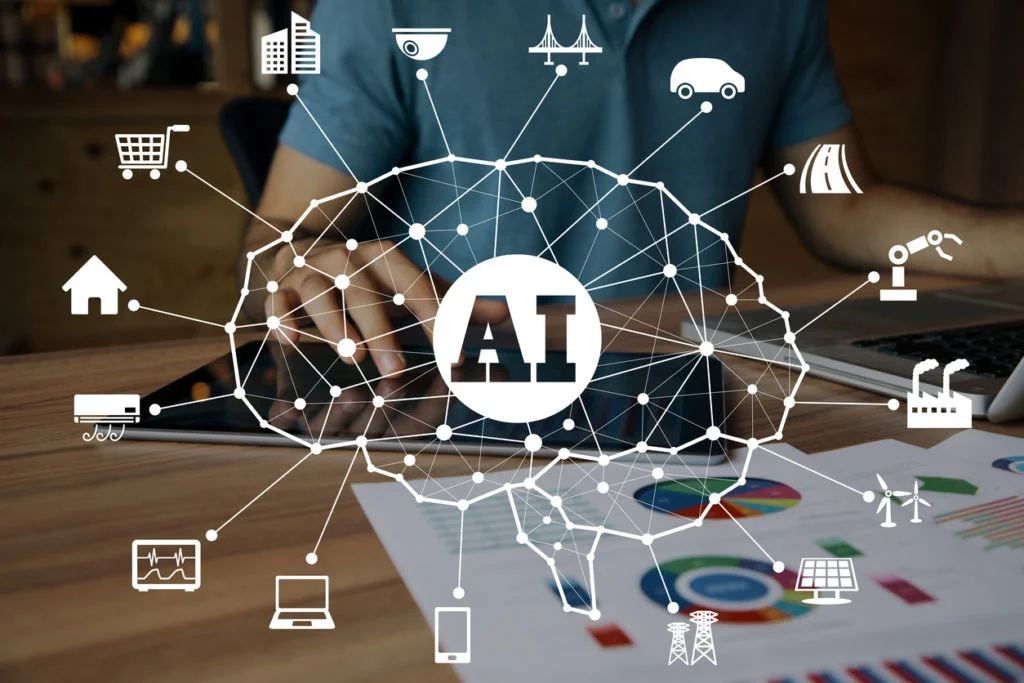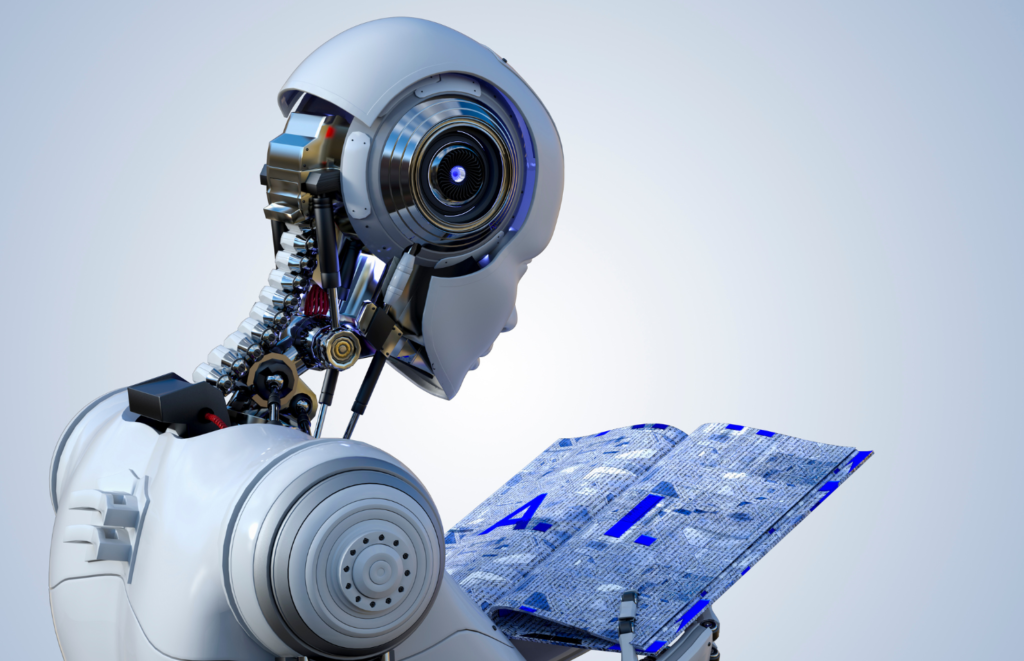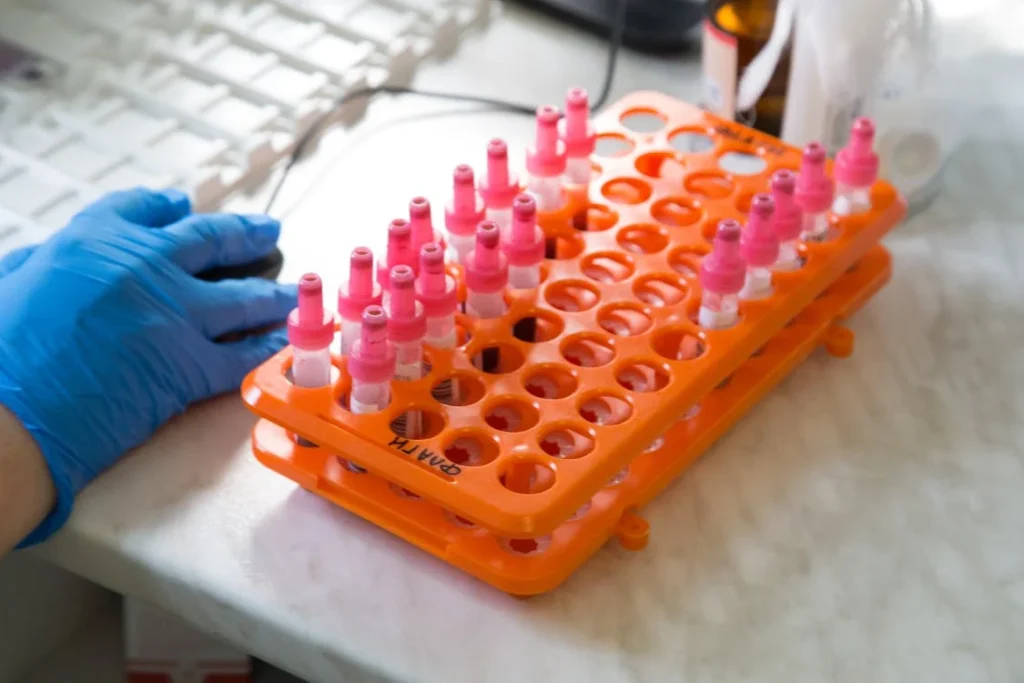The healthcare and life sciences industries are experiencing significant advancements and innovation because of artificial intelligence.
AI is accelerating improvements in medication development and research. Diagnoses can now be made more accurately and quickly. And it’s making business procedures far more efficient.
Given how many of us stand to gain from it, that is notable. Clearly, healthcare is one of the sectors where AI has the greatest potential to make an impact.
The Growth of AI in Healthcare
The global artificial intelligence (AI) in the healthcare market, which was valued at US$10.4 billion in 2021, is set to grow at an annual compounded growth rate (CAGR) of 38.4 percent from 2022 to 2030.
According to a 2018 McKinsey study, the pharmaceutical and healthcare industries stand to gain significantly from AI and robotics. According to the paper, big data initiatives might help the US healthcare sector save up to $100 billion annually by improving trial, research, and clinical practice efficiency.
Furthermore, AI proved crucial in the battle against COVID-19. The World Health Organization (WHO) indicated that AI might be a key technology to control the problem brought on by the virus not long after the pandemic was declared. We examine more ways AI might transform healthcare in the future.
7 Ways AI Can Help Revolutionize Healthcare
One-fourth of the population in North America and Europe will be over 65 by 2050, which means the healthcare systems will have to cope with more patients who have complicated needs. Systems must change from a mindset of episodic care to one that is considerably more proactive and centered on long-term care management.
Healthcare systems will have difficulty remaining sustainable without significant structural and transformative reform.
Artificial intelligence (AI), which builds on automation, has the potential to revolutionize healthcare and help with some of the issues mentioned above. Let’s examine 7 ways in which AI might revolutionize healthcare and enhance effectiveness, accuracy, and patient outcomes.
1. Improved Drug Research and Discovery
AI tools are being created to find novel potential treatments from enormous databases of data on currently available drugs, which may be redesigned to focus on serious dangers like the Ebola virus. This could increase the effectiveness and rate of drug research, hastening the release of new medications in response to the threat of fatal diseases.
It takes a long time and a lot of money to get a drug from the research facility to the patient. A drug makes its way from a research facility to a patient in an average of 12 years, as reported by the California Biomedical Research Association.
Of the 5,000 medications that start preclinical testing, only five reach human trials, and only one of these five is ever authorized for use in humans. Additionally, the average cost for a business to produce a new drug from the research facility to the patient is US $359 million.
One of the more recent uses of AI in healthcare is drug discovery. It may be possible to dramatically reduce the time to market for new pharmaceuticals as well as their prices by applying the most recent developments in AI to automate the drug discovery and drug repurposing processes.
A real-world example of AI’s use in drug research and discovery is Achievion’s drug effectiveness prediction software. Data samples were gathered by the Achievion team from a variety of sources, including the R&D department of the business, epidemiological research, EHRs, healthcare facilities, and public databases.
The data was then tagged and cleaned up for efficient processing. The data scientists at Achievion developed a model that could forecast drug effectiveness across a variety of parameters using several Machine Learning algorithms, methodologies, and frameworks. Additionally, in the event of subpar treatment results, the solution can recommend alternate clinical trial methods.
2. Better Patient and Employee Experience
Numerous hospitals and healthcare organizations place a high focus on patient happiness. Patient data can become priceless with machine learning and artificial intelligence (AI), offering insights into areas where the patient journey needs to be improved.
Since patient experience is closely correlated with better compliance and medication management, machine learning systems afford hospitals the chance to boost overall health outcomes. Additionally, AI can offer more convenient and customized healthcare. Patient happiness can also be increased by healthcare organizations using chatbots.
As of 2019, a Pegasystems survey of 2,000 health providers indicated that over half (42 percent) of respondents claimed they are satisfied with their providers using AI to make healthcare choices; it appears that many individuals are delighted to see AI being utilized.
AI can also be extremely helpful for healthcare personnel because it can finish a variety of manual chores, freeing up humans’ time and lowering burnout. Up to 70% of a healthcare professional’s time can be spent on administrative and regular chores, which AI can assist eliminate or reduce.
3. Streamlined Medical Processes
Image classification, which facilitates extracting data from several images to assist healthcare professionals like radiologists to mark files and tagging low-priority X-rays, is one-way artificial intelligence and deep learning are currently being used in healthcare. This makes the process faster, simpler, and more accurate.
Researchers at Oxford Hospital in the UK are meantime utilizing this technology to aid in improving lung cancer and heart disease diagnostics. Additionally, AI can speed up the funding and referral of patients to specialists as well as provide faster, more precise, and more useful insights for both physicians and their patients.
However, it’s crucial to stress that this doesn’t render people obsolete; rather, it gives healthcare providers more time to devote to more individualized patient care and less tedious chores.
In order to help their staff evaluate routine pathology or radiological data more quickly and properly, healthcare providers can use AI tools, according to a PWC study. This will enable them to see more patients and generate more income.
4. Improved Diagnosis
AI provides practitioners with clean data rapidly, enabling more precise diagnosis. That unmistakably solves a major problem in the healthcare industry. According to estimates, misdiagnosis accounts for up to 80,000 hospital fatalities annually and billions of dollars’ worth of unnecessary medical expenses.
Terabytes of information would traditionally need to be processed in order to diagnose a patient. Businesses may now use AI to crunch numbers, with human review of the outcomes.
Hospitals can more quickly and accurately diagnose a variety of health issues by improving the use of AI for medical surveillance. AI-enabled clinical surveillance for diseases that have previously shown resistance to prevention can save lives and cut expenses.
In order to identify patients who are at risk for healthcare-associated conditions, AI can analyze massive amounts of data. This allows physicians to act more rapidly to treat patients before their illnesses worsen and to stop the spread of diseases among hospitalized patients.
By 2030, healthcare systems might, for instance, predict when a person was in danger of acquiring a chronic disease and recommend preventative steps before the condition worsened, according to the World Health Organization. Due to the effectiveness of this innovation, the prevalence of diabetes, heart failure, and COPD has decreased.
AI is also playing a role in advancing radiology to improve patient diagnosis. To automate picture analysis and diagnosis, AI systems are currently being developed. This can increase efficiency and lower human error by drawing a radiologist’s attention to key regions of interest on a scan.
Additionally, there is potential for fully automated solutions, which would read and interpret scans without human intervention, enabling immediate analysis in underserved areas or after work hours.
The development of new prospects for cancer prevention is illustrated by recent examples of enhanced tumor identification on MRIs and CT scans. A startup in the USA has, meantime, already secured FDA approval for a platform that uses AI to evaluate and assess cardiac MRI images.
5. Automating COVID-19 Reporting
One of the many brand-new difficulties the pandemic has brought about is the addition of more daily reporting obligations. To overcome this problem, daily Covid status reports submitted to health departments are now being automated by some labs associated with a specific hospital.
These labs spent a lot of time trying to accurately portray the situation in the hospital. The labs were adamant that the procedure must not prohibit them from devoting as much of their time as they could to patient care even though the former was a vital aspect of the nation’s response to COVID-19. Thus, they worked with AI developers to create software that can handle the reporting process by automatically obtaining data from patient and HR administration systems.
These labs can now spend more time caring for patients because the clinical staff’s substantial administrative burden has been removed, and reporting errors have also been eliminated. And on top of that, the labs have experienced significant time and cost savings in their COVID-19 reporting efforts.
6. Automating Insurance Claims Processing
AI can be used by the insurance industry to enhance and automate its processes. Suppose that an insurance company sees the patient’s email and the claim that is attached. The business then enters the patient’s policy number after opening its health claim system. In this manner, the insurance provider can determine if the patient qualifies for the claim.
After that, the insurer emails the client with something to the effect of: “We acknowledge your claim. You are eligible for $1650 of the $1900 available. In 22 days, your check will be mailed.” In situations when insurance companies collaborate directly with healthcare providers, this would function similarly.
Thanks to automation platforms integrated with AI (IAPs), this procedure can be automated. They fully automate the claims procedure. Data from claims can be ingested, extracted, and analyzed by IAPs. In order to comprehend patient qualifications and coverage, they can use business rules. Additionally, they are able to give that data to the patients, the insurance, and its associates.
7. Converting EHR into a Health Risk Predictor
EHRs contain a plethora of patient data, but it has proven to be difficult for developers and physicians to extract and analyze that data in a way that is precise, timely, and reliable.
Understanding precisely how to participate in effective risk categorization, prescriptive modeling, and clinical decision support has proven to be exceedingly challenging due to data quality and integrity difficulties, a mix of data formats, unorganized and structured sources, and incomplete records.
Integrating the data in one location is a challenge that must be overcome. Understanding what you’re obtaining when you predict an illness in an EHR, though, is a different issue.
You may have been told that the algorithm can foretell depression or stroke. However, when you dig further, you realize that what an algorithm is essentially forecasting is a billing code for a stroke. That differs greatly from a stroke itself.
It might seem like relying on MRI results would provide a more solid dataset. However, you now need to consider who can afford an MRI and who cannot.
EHR analytics has given rise to a number of effective risk scoring and stratification tools. But in order to implement tools that will actually improve clinical treatment, it is essential to make sure that those algorithms do not reinforce latent biases in the data.
Final Word
The need for fresh, innovative solutions in healthcare is obvious given the myriad problems that must be solved, many of which are caused by well-known reasons like an aging population and rising rates of chronic disease.
Despite receiving a lot of media attention, AI-powered solutions have only made minor progress in resolving important concerns and have yet to have a significant overall influence on the global healthcare sector.
Hybrid models, where professionals are assisted in diagnosis, care planning, and risk factor identification but maintain overall responsibility for the patient’s care, present the best potential for AI in healthcare over the coming years.
Reducing perceived risk will speed up adoption by healthcare providers and begin to provide measurable gains in patient care and operational excellence on a large scale.
Achievion can help you build intelligent and efficient AI solutions for healthcare that make life easier for physicians, other medical practitioners, and the administrative staff at labs, clinics, and hospitals. Get in touch with the team today to know more.









